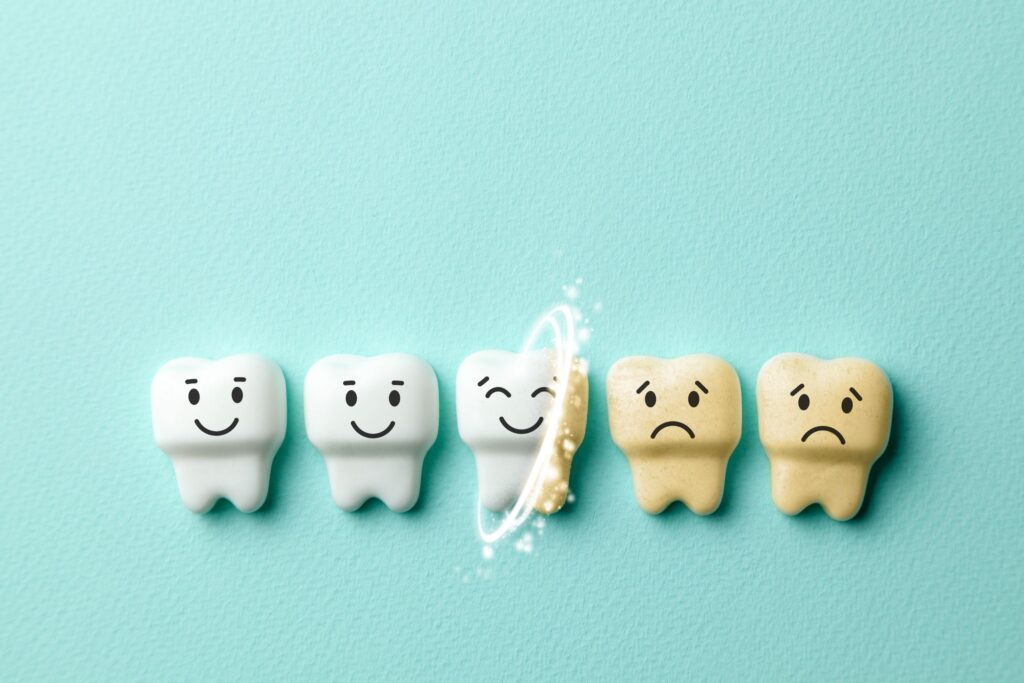
Do you have dental discoloration detracting from your appearance? You’re not alone if you have stubbornly stained teeth that make you feel self-conscious. Every year, an estimated 40 to 45 million Americans use some form of teeth whitening to lighten their smiles and boost their self-confidence.
Unfortunately, some patients wanting brighter grins end up developing sensitivity and don’t understand why. Continue reading to learn more about how this sometimes happens and what you can do to prevent it!
How Does Teeth Whitening Work?
Your teeth might look more yellow or brown than pearly white for several reasons, but extrinsic stains are the most common cause. These blemishes occur in your enamel after repeated or prolonged exposure to darkly tinted foods and drinks, like tea, coffee, berries, tomatoes, and wine. The pigmented particles cling to your teeth and infiltrate microscopic pores in the surface, leaving them looking dirty.
Whitening products typically contain bleaches, like hydrogen or carbamide peroxide, that undergo a chemical reaction when they come into contact with your saliva. They release oxygen molecules that attach to and break down colored particles on your teeth, reducing their size and concentration to eliminate surface stains.
Why Does Teeth Whitening Sometimes Cause Sensitivity?
Have you noticed a mild discomfort or tingling in your teeth after your treatment, especially when biting into anything too hot or cold? If so, you might have developed sensitivity, which can have a few causes. For example, as the bleach penetrates your enamel, it opens the pores and exposes more of the lower layer of dentin, which contains tiny tubules connected to nerve endings. If these are triggered, you might notice a mild or moderate ache.
It can also happen if you inadvertently apply whitening products to your gums, which are much softer than enamel. This might be the culprit if your connective tissues are tender or appear darker, swollen, or have sore spots. You might also have a negative reaction if you apply topical bleach over a hidden cavity or repeat the treatment without waiting long enough.
How Can I Reduce Sensitivity with Teeth Whitening?
Many patients turn to over-the-counter whitening strips, pastes, and gels to avoid the higher prices associated with professional services. Unfortunately, they often develop sensitivity by overapplying diluted bleaches that don’t provide the desired results.
The safest way to lighten your smile is to contact your dentist first. They’ll examine your mouth to ensure no pre-existing issues, like gum disease or cavities, cause discomfort or interfere with the outcome. Then, they can provide in-office services for an instant upgrade or a take-home kit with professional-strength gels designed to mitigate potential problems. These typically include custom-fitted trays for a more accurate application.
Professional whitening from your dentist allows you to achieve a noticeably brighter grin while minimizing potentially adverse effects!
Meet the Author
Dr. Maryam Bemani enjoys establishing relationships with patients in Catonsville so she can help them improve their daily lives by enhancing their dental health. She earned her dental degree from the University of Maryland School of Dentistry and has completed many continuing education courses to focus on different topics. Today, she is passionate about providing a comprehensive menu of services to meet your unique needs under one roof, including in-office and take-home teeth whitening solutions. You can request an appointment on the website or by calling (443) 251-5580.
